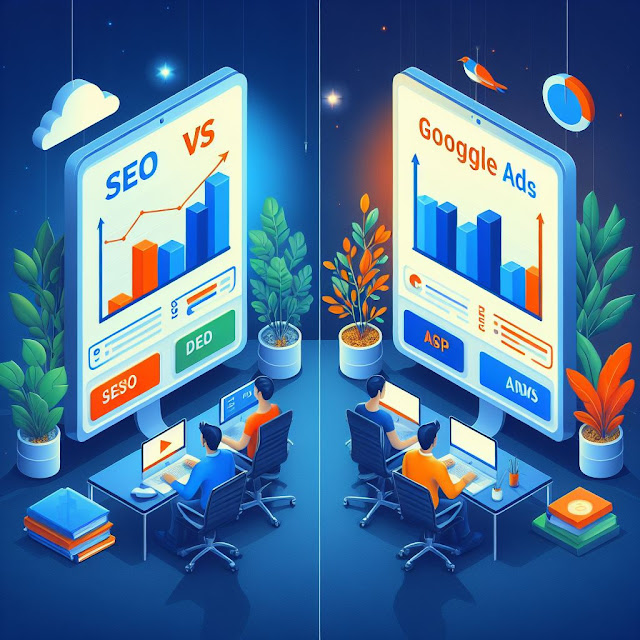Which Strategy Works Best for Your Business? SEO ( Search Engine Optimization) OR Google Ads (Pay Per Click) !
In the search engine marketing arena, two heavyweights often dominate the ring: Search Engine Optimization (SEO) and Google Ads. Both strategies aim to increase visibility and drive traffic to your website, but they have distinct approaches and advantages. Let's dive into the world of SEO vs. Google Ads to understand their differences and determine which one suits your business needs best.
Understanding SEO (Search Engine Optimization)
Search Engine Optimization (SEO) involves optimizing your website's content and structure to rank higher in organic search results. It's a long-term strategy focused on improving your site's visibility and authority, ultimately driving sustainable traffic.
- Key Points:
- Organic Traffic: SEO generates organic traffic, meaning visitors find your website through unpaid search results.
- Content Optimization: Quality content, keyword research, and on-page optimization are crucial aspects of SEO.
- Time Investment: SEO takes time to yield results but can provide long-term benefits and a higher return on investment (ROI).
Exploring Google Ads (Paid Advertisement known as PPC)
Google Ads, formerly known as Google AdWords, is a paid advertising platform that allows businesses to display ads on Google's search engine results pages (SERPs), websites, and other platforms within the Google Network.
- Key Points:
- Paid Traffic: Google Ads drive paid traffic to your website by displaying ads to users based on their search queries and browsing behavior.
- Targeted Advertising: With Google Ads, you can target specific demographics, locations, and keywords to reach your ideal audience.
- Immediate Results: Unlike SEO, Google Ads can generate immediate visibility and traffic for your website, making it ideal for short-term campaigns and promotions.
Pros and Cons : SEO vs Google Ads
Let's weigh the pros and cons of each strategy to better understand their implications for your business:
- SEO Pros
- Long-Term Sustainability: SEO efforts can result in sustainable organic traffic over time, reducing dependency on paid advertising.
- Trust and Authority: High organic rankings often convey trust and authority to users, enhancing your brand's credibility.
- Cost Efficiency: While SEO requires upfront investment, the ongoing traffic it generates can lead to a lower cost per acquisition (CPA) in the long run.
- SEO Cons
- Time-Intensive: SEO requires ongoing optimization, content creation, and patience to achieve desired results, making it a long-term commitment.
- Uncertain Results: Ranking algorithms and competition can impact SEO success, leading to fluctuating performance and outcomes.
- Google Ads Pros
- Immediate Visibility: Google Ads can quickly place your ads at the top of search results, ensuring immediate visibility for your business.
- Targeted Reach: Advanced targeting options enable precise audience segmentation, maximizing the relevance of your ads and increasing conversion rates.
- Measurable Results: Google Ads provides comprehensive analytics and tracking tools to measure campaign performance and optimize your advertising strategy in real time.
- Google Ads Cons
- Cost Variability: Google Ads operate on a pay-per-click (PPC) model, meaning costs can vary based on competition, keywords, and bidding strategies.
- Dependency on Budget: Continuous ad spend is required to maintain visibility and traffic, making Google Ads less sustainable than organic SEO in the long run.
Know which is Best for your Business - Choosing the Right Strategy
Ultimately, the decision between SEO and Google Ads depends on your business goals, budget, and timeline. Consider the following factors when making your choice:
- Budget
Determine how much you're willing to invest in marketing and advertising efforts. SEO requires upfront investment and ongoing maintenance, while Google Ads entail immediate costs for ad placements.
- Timeline
Assess your timeline for achieving results. If you need immediate visibility and results, Google Ads may be the preferred option. However, if you're willing to invest time in building organic traffic, SEO can provide long-term benefits.
- Goals
Define your marketing objectives, whether it's increasing brand awareness, driving sales, or improving website traffic. Align your chosen strategy with these goals to maximize effectiveness.
Its time to Short Reminder
In the battle of SEO vs. Google Ads, there's no one-size-fits-all solution. Both strategies offer unique advantages and play crucial roles in a comprehensive digital marketing strategy. By understanding their differences and considering your business needs, you can make an informed decision to propel your online presence and achieve marketing success.






